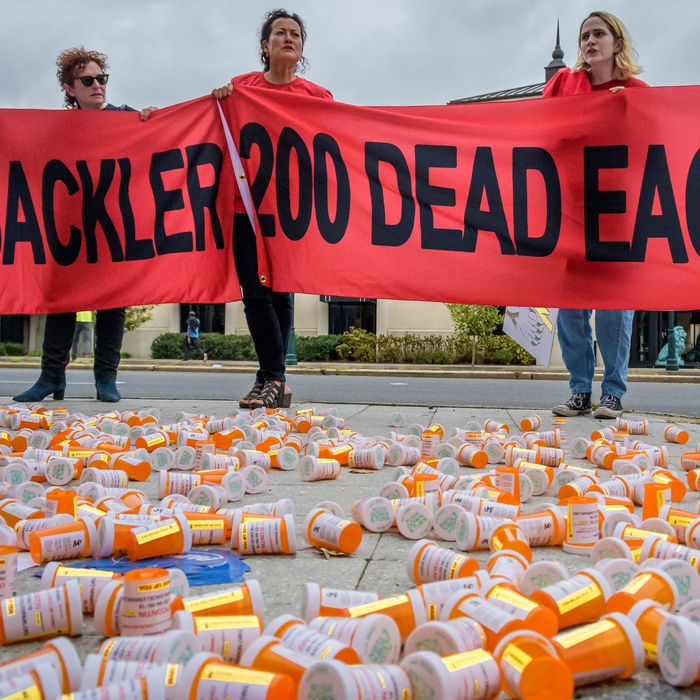
Purdue Pharma is about to have a moderately unpleasant day. The maker of OxyContin will plead guilty to three criminal charges as part of an $8.3 billion settlement with the Justice Department, the Associated Press reported on Wednesday. As part of the deal, the company will own up to a “conspiracy to defraud the United States and violating federal anti-kickback laws,” among other charges. The timing is politically advantageous to Attorney General Bill Barr, and also to Donald Trump. With the presidential election now less than two weeks away, the president is at a loss to prove he’s fulfilled any of the many promises he’s made to voters — and that includes his pledge to address the opioid epidemic.
But Wednesday’s settlement is piecemeal justice. As The New Yorker’s Patrick Radden Keefe noted on Twitter, Purdue is already in bankruptcy. The Sackler family — members of which played a definitive role in shaping Purdue’s marketing of OxyContin — have also moved massive wealth out of the company:
So Purdue may not ever pay the full $8.3 billion to the federal government. Details of the settlement also aroused the ire of some state governments, which had collectively sued the company for its role in exacerbating a public-health crisis that has killed hundreds of thousands of people. The Justice Department intends to turn Purdue into a “public-benefit company,” which means the company would be operated by government-appointed trustees. Purdue would remain a profit-making enterprise, but the money it pulls in would allegedly fund public-health initiatives designed to treat substance abuse.
According to the AP, about half of the state governments involved in lawsuits against Purdue oppose making the company a public-benefit corporation. Under the agreement, funds made from the sale of OxyContin could theoretically treat people who have become addicted to the very same drug. Those state governments are using bankruptcy-court proceedings to pursue documents that would, they say, reveal new details about how much the Sacklers made from OxyContin, and when. Though the Justice Department’s new settlement does not protect the Sacklers from criminal investigation, it also doesn’t provide a way to hold the Sacklers themselves accountable for their role in Purdue’s misleading marketing campaign.
And Purdue itself gets off with a relatively light penalty. The company is about to plead guilty to serious charges: that it lied repeatedly to the Drug Enforcement Agency about the strength of its drug-diversion program and reported “misleading information” in order to keep manufacturing quotas high. It also broke federal law “by paying doctors, through a speaking program, to induce them to write more prescriptions for the company’s opioids and for using electronic health records software to influence the prescription of pain medication,” the AP added.
Those practices made Purdue a lot of money, but they had life-or-death consequences for people less fortunate than the Sacklers. The Centers for Disease Control and Prevention estimate that 232,000 people total have died from an overdose of prescription opioids from 1999, three years after OxyContin entered the market, to 2018. Death rates increased exponentially over time; according to the CDC’s data, deaths were four times higher in 2018 than they had been in 1999. Most drug-overdose deaths in the U.S. involve an opioid, though the culprit is typically a synthetic opioid, and not a prescription painkiller like OxyContin.
But OxyContin is more habit-forming than Purdue originally admitted, and that’s the origin of federal and state complaints against the company. Previous legal filings, and reporting in ProPublica, the New Yorker, and the New York Times, revealed that a branch of the Sackler family had helped design and carry out the misleading marketing campaign that first pitched OxyContin to doctors as a safe, and relatively nonaddictive, treatment for serious pain. Despite growing evidence connecting the drug to a proliferation of substance abuse in some communities, Richard Sackler, the former president of Purdue, suggested a scapegoat. “We have to hammer on abusers in every way possible,” he wrote in a 2001 email to Purdue executives. “They are the culprits and the problem. They are reckless criminals.”
The reckless criminals always resided inside Purdue’s house. The first time the company pleaded guilty to criminal charges over its marketing of OxyContin, George W. Bush was still president. Purdue paid out $600 million fines; three executives collectively paid another $34.5 million over their specific roles in the corporation’s misbranding scheme. Thirteen years later, it’s obvious that the fines did not induce a moral epiphany within the Sackler clan, or within Purdue itself. The story of Purdue, and of the Sackler family, remains one of impunity. Wednesday’s settlement doesn’t bend history in the direction of justice. Tomorrow, the Sacklers will still be rich, and thousands of people will still be dead.
"again" - Google News
October 22, 2020 at 01:33AM
https://ift.tt/34hhdgI
OxyContin Maker Will Plead Guilty to Criminal Charges, Again - New York Magazine
"again" - Google News
https://ift.tt/2YsuQr6
https://ift.tt/2KUD1V2
Bagikan Berita Ini














0 Response to "OxyContin Maker Will Plead Guilty to Criminal Charges, Again - New York Magazine"
Post a Comment